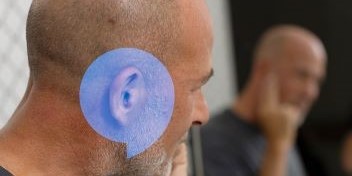Tinnitus affects 1 in 8 adults in the UK, and many more people around the world. Sufferers experience the of hearing noises that aren’t caused by an outside source, like buzzing or ringing in the ears or head.
The most common cause of tinnitus is damage and loss of the tiny sensory hair cells in the cochlea, part of the inner ear. Although this tends to happen as people age, it can also be a result of prolonged exposure to excessively loud noise.
Following a recent scientific breakthrough, there could one day be a cure for this debilitating condition. The discovery suggests that neuroinflammation could be to blame for the tinnitus.
The research
Scientists in Arizona, US, found that the condition was stopped in mice by blocking a protein which caused neuroinflammation, or inflammation of the nervous system.
The scientists examined neuroinflammation in the auditory cortexes of mice with noise-induced hearing loss, and its role in tinnitus. The researchers’ results indicate that noise-induced hearing loss is associated with elevated expression of a particular protein.
The team also identified a molecule as a potential cause of neuroinflammation and tinnitus. By blocking this molecule in mice, who had been exposed to loud noise for two hours, the scientists were able to stop the tinnitus.
Study co-author Dr Shaowen Bao, said, "The results indicate noise-induced hearing loss is associated with elevated levels of molecules called proinflammatory cytokines and the activation of non-neuronal cells called microglia – two defining features of neuroinflammatory responses."
He continued to add: “These results implicate neuroinflammation as a therapeutic target for treating tinnitus and other hearing-loss-related disorders.”
But he pointed out that although the therapy was successful in animals, any potentially adverse effects need to be thoroughly investigated before any human trials.
If these findings (published in the PLOS Biology journal1), are translated over to humans after successful trials, drugs that block the molecule could become a new treatment and, ultimately, a cure for tinnitus.
Feel you can’t wait for a cure?
A lot of our customers at Hidden Hearing suffer from tinnitus, and we try to help them manage the condition. There are many different hearing aids that offer built-in tinnitus sound management systems. These have a range of customisable tinnitus relief sounds that are dynamic and soothing. including broadband sounds (white, pink and red noise) and natural, ocean-like sounds.
If you’re suffering from tinnitus or hearing loss, you can book your free hearing test today.
Source:
1. Weihua Wang, Li. S. Zhang, Alexander K. Zinsmaier, et al. “Neuroinflammation mediates noise-induced synaptic imbalance and tinnitus in rodent models”, PLOS Biology, June 18, 2019.





